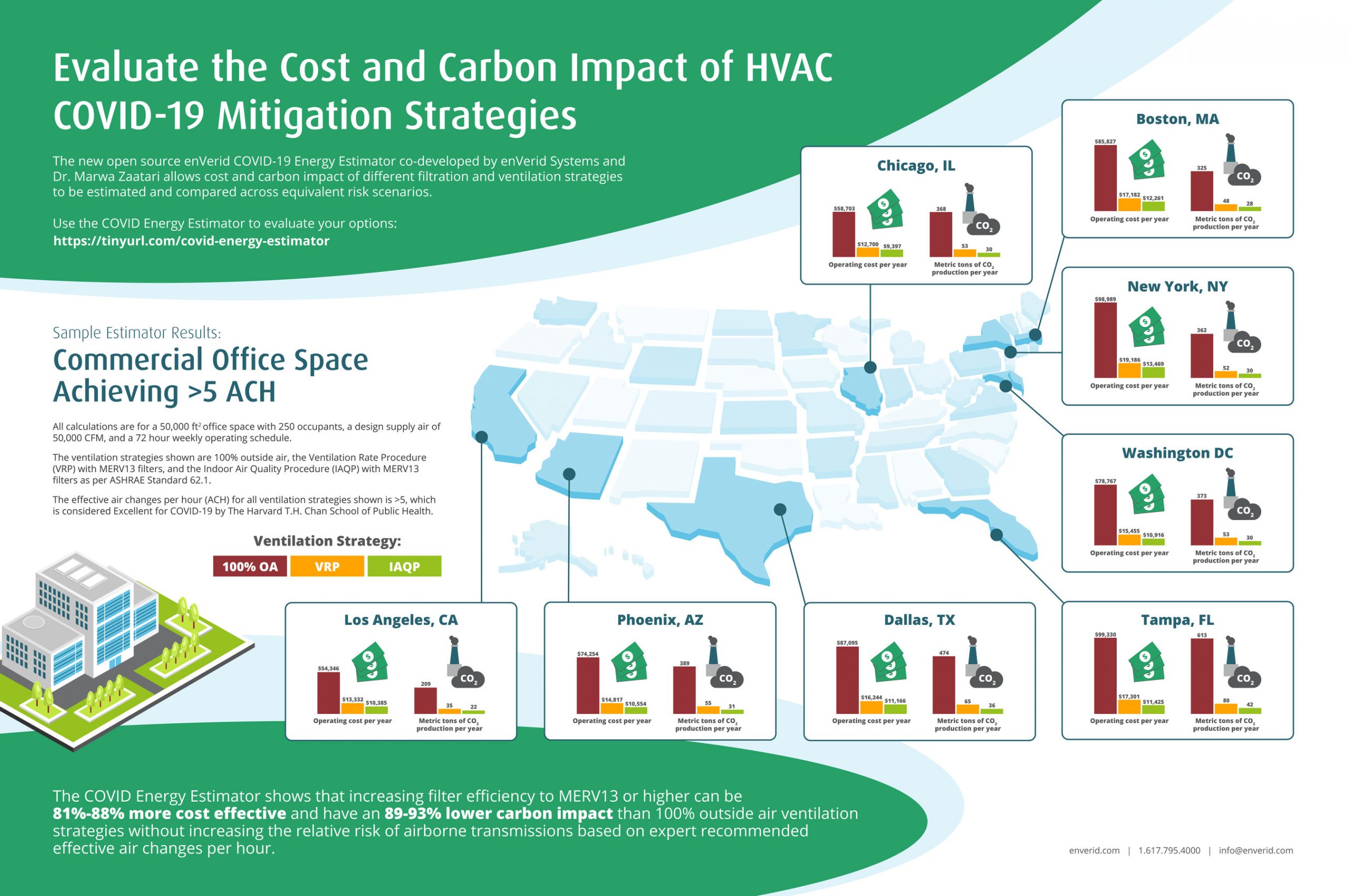enVerid Systems, a leading provider of indoor air quality solutions, today shared a new tool to calculate energy, costs and carbon impact of various HVAC strategies for mitigating airborne transmission of COVID-19. The free, open-source enVerid COVID-19 Energy Estimator allows building owners, mechanical engineers, and facility managers to quickly gain a more complete picture of the risk, costs, and carbon impacts of different ventilation and filtration approaches. The enVerid COVID-19 Energy Estimator is informed by enVerid’s decade-long focus on indoor air quality (IAQ) and energy efficiency.
The enVerid COVID-19 Energy Estimator was co-developed by enVerid Systems and Dr. Marwa Zaatari, P.E., an ASHRAE Distinguished Lecturer and member of the commercial team and building reopening team for the ASHRAE Epidemic Task Force. Dr. Zaatari is principal of Dzine Partners, LLC and an advisor to enVerid Systems. Dr. Zaatari previewed the new tool during a recent webinar for a large audience of building engineers and facility managers.
“The COVID Energy Estimator is a timely tool to help engineers and building managers assess different ventilation and filtration strategies in terms of risk mitigation, cost and carbon impact,” said Barry Abramson, P.E. and principal of Servidyne. “I commend enVerid and Dr. Zaatari for tackling this project. It is the most useful HVAC-focused risk estimator that we’ve seen, and even in this early iteration it will be very helpful for developing re-entry strategies for our clients’ buildings. I encourage my industry colleagues to use the COVID Energy Estimator and urge them to take an active role in offering feedback to further advance this valuable, new analytical tool.”

The open-source enVerid COVID-19 Energy Estimator allows cost and carbon impact of different HVAC filtration and ventilation strategies to be estimated and compared across equivalent risk scenarios.
“Two developments drove the need for the COVID Energy Estimator,” said Christian Weeks, CEO of enVerid Systems. “First, it is now generally accepted that both ventilation and filtration approaches on their own or in combination can reduce the risk of airborne transmission of SARS-CoV-2. Second, as we head into the colder months it has become harder to ignore the ‘energy penalty’ from simply increasing outside air ventilation. What remained poorly understood until now was the specific impact different ventilation and filtration strategies might have on energy consumption and operating costs. We are delighted to collaborate with Dr. Zaatari to share a tool that can be used to compare the cost and carbon impacts of different risk reduction strategies with the goal of opening buildings safely while balancing costs and sustainability objectives.”
During an October webinar hosted by enVerid, Prof. Bill Bahnfleth, Chair of ASHRAE’s Epidemic Task Force, explained that initial guidance from ASHRAE released in the spring was very conservative without consideration for cost, operational, and seasonal weather impacts. He went on to explain that ongoing assessment of the guidance, including consideration of equivalent outdoor air approaches, has led ASHRAE to conclude that high-efficiency filtration, when installed correctly, can be as effective and lower cost than ventilation and often more feasible technically. According to Prof. Bahnfleth, who was one of the peer reviewers of enVerid’s new tool, “The COVID Energy Estimator confirms these findings quantitatively by showing the cost and carbon tradeoffs of different ventilation approaches that deliver the same relative risk outcomes.”
Why it is important
For existing commercial buildings, facility engineers and building managers need to make informed decisions about how to reduce the risk of airborne transmission of SARS-CoV-2, taking into account the energy costs associated with different approaches and planning for the impact on their operating budgets. New HVAC systems will need to be designed with the dual priorities of pandemic future proofing and maximizing energy efficiency to save money and lower carbon emissions. The optimal strategies will vary by climate zone and energy costs, and the COVID Energy Estimator can be used to evaluate these tradeoffs for different metropolitan areas taking into account local energy rates.
For example, building engineers evaluating a 50,000 ft2 office space in Boston with 250 occupants and a design supply air of 50,000 CFM and a 72 hour operating schedule can compare two approaches, switching to 100% outside air (OA) or upgrading to MERV 13 high-efficiency filters and bringing in minimum outside air as per the ASHRAE Standard 62.1 Indoor Air Quality Procedure (IAQP). The Energy Estimator shows that both strategies will deliver over five effective air changes per hour (ACH), which is considered excellent by the Harvard School of Public Health, but the 100% OA strategy will cost $85,827 per year compared to $12,261 per year for the MERV 13/IAQP approach. When reviewing the carbon impacts of the two approaches, the COVID Energy Estimator shows that the 100% OA strategy will generate 325 metric tons of CO2 per year vs. 28 metric tons for the MERV 13/IAQP approach.
The enVerid COVID-19 Energy Estimator is free and available for download HERE.





